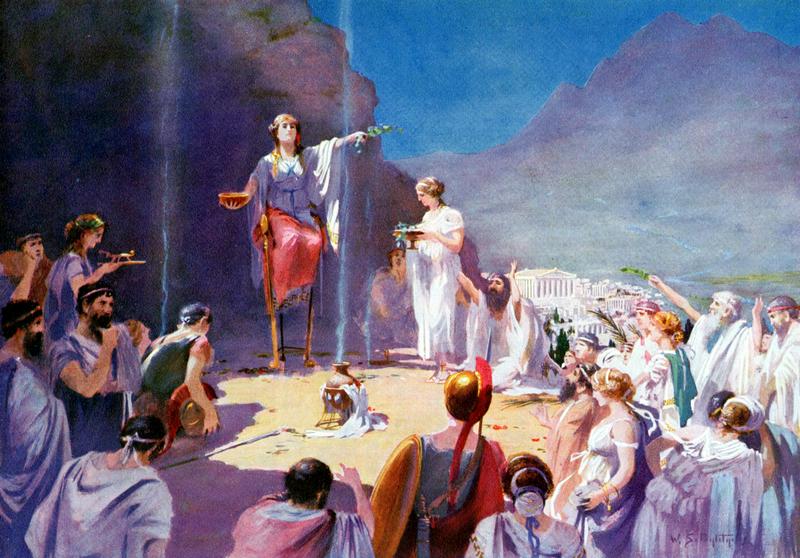Forecasting the Future With the Oracle Of Delphi
By | October 19, 2019

The most important religious site in Ancient Greece was the Temple of Apollo at Delphi. It was thought to be the center of the world and at its heart was a mysterious oracle who prophesied the future as if she was the mouthpiece of the god. This was the famous oracle of Delphi.

Early History
The site of Delphi is located in a dramatic mountainous landscape that provides an atmosphere conducive to religious awe. The original name for Delphi was Pytho, which references a myth of a snake that Apollo had slain in order to establish his sanctuary under Mount Parnassos. The sanctuary itself was thought to be built possibly by people from Crete, no later than the 11th century BC. According to myth, these early inhabitants worship the earth goddess, Gaia, but she was supplanted by Apollo. In the seventh century BC, temples to both Apollo and the goddess Athena were built.
While there were many oracles in the ancient world, the most renown was the one at Delphi. The Delphic oracle, or high priestess, was called Pythia and was believed to be able to channel prophecies from the god Apollo and served as the head of the religious sanctuary. From approximately 800 BC until 393 AD a succession of women took on this role. People would consult the oracle on all sorts of matters: birth, death, sickness, family, wealth management, war, and peace. They reached the peak of their popularity in the 7th and 8th centuries BC at which time there may have been three priestesses available for consultation at any given time.

Who was the Oracle?
Curiously, even though the Delphic oracle was consulted frequently during antiquity, very little is known about how the priestesses lived, or even how consultations were made. According to some scholars, this is because at the time the knowledge of how to go about consulting the oracle was so commonplace that it was never written down. Also little is known on how the oracles lived. Ancient Greece was strongly patriarchal and the oracles being women, did not interest Greek writers outside of their prophecies. We do know, however, that they were always local women who served for life and lived apart from the rest of society.

Making a Consultation
While priestesses were available for consultation nearly every day, the oracle only made her prophecies once a month. There was a queue as to who could consult the oracle, locals first, then Greeks, then foreigners. The consultees had to pay a fee that amounted to the purchase of a sacrificial cake from the Delphians called a pelanos which was burned on the altar. Charges varied by city or person with some city representatives being free of charge if they had donated objects or built some of the architecture of the temple.

Making the Prophecy
On the day of a prophecy, the oracle cleansed herself naked at a spring near the temple and then drank the sacred water of another spring, the Cassotis which ran close to the temple and was supposedly infused with the power of a resident naiad, or water spirit. In order to check to see if Apollo could be channeled through the oracle that day, water was sprinkled onto a goat. If the goat shook then it was sacrificed to the god making it known that the oracle could make pronouncements on behalf of Apollo. Meanwhile, consultees purified themselves in the spring.
Prophecies took place inside the adyton, an inner restricted place within the core of the temple. The Pythia is often seen sitting next to a laurel tree, which was the only wood burned at the altar for the god. The time had come for a prophecy.
Ancient writers described how the oracle was affected by vapors emanating out of the earth or waters which they inhaled. It was believed that the vapors, called pneuma, created a mind-altering trance on Pythia who then made her pronouncements. It was believed that because of the purity of Pythia, that only she could commune with the god while the vapors did not impact others present. Some, such as Plutarch, recorded that the oracle went into a calm state with an altered voice. The writer Lucian, however, recorded that the oracle raved. The geographer Strabo recorded, “They say that the seat of the oracle is a cavern hollowed deep down in the earth, with a rather narrow mouth, from which rises a pneuma that produces divine possession. A tripod is set above this cleft, mounting which, the Pythia inhales the vapor and prophecies.”
Plutarch contended that during his time (46-120 AD) the source of the vapors had been partially blocked up thus diminishing the power of the oracle.

Vapors
The theories of vapors were largely discounted a century ago when archaeologists could find no source of the pneuma. However, recent geological evidence has found faults and the source of the vapors -- light hydrocarbon gasses from bituminous limestone. Also, methane, ethylene, and ethane have been found in the spring water near Delphi. It turns out the ancient sources may be right since all of these chemicals have mind-altering qualities.

Enigmatic Advice
The oracle’s prophecies were often enigmatic and could be interpreted in several ways. This protected her reputation for centuries. As an example, one of the most famous pronouncements was to Croesus of Lydia who asked Pythia if he should make war on the Persians. Her response was that he “ would destroy a mighty empire.” After other prophecies, he decided to make war on the Persians. The result was that his own empire was destroyed.

“All is ended”
The Delphic oracle was consulted right through the 4th century AD when the rise of Christianity resulted in the Roman Emperor Theodosius closing down the temple permanently in 393 AD. The last recorded prophecy from the oracle is recorded to have been “all is ended.” Theodosius died within five years and the city of Rome was sacked by the Visigoths in 410.
The ruins of the Delphic oracle today is a popular tourist destination and a UNESCO World Heritage Site. While one can no longer consult with Pythia, they can certainly drink from the same mind-altering waters.

